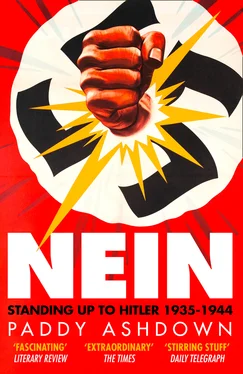With her lover busy out of Berlin taking over his new organisation, Madeleine Bihet-Richou used the opportunity for a swift visit to Paris. There she received training in the use of secret ink, and underwent a deep-level interrogation about her relationship with Lahousen and his possible motives in talking to her so openly.
The early months of 1939 were full of intense diplomatic manoeuvring as everyone waited for Hitler’s next play. On 20 February, Spain, under substantial German and Italian pressure, agreed ‘in principle’ to join Hitler’s Anti-Comintern pact, insisting, however, that it should do so secretly. Five days later, to even up the balance and keep everyone on their toes, Franco signed an agreement with France that Madrid would stay neutral. Most small states in Europe, inferring from the Czech crisis that the Pax Britannica of the nineteenth century was now a dead letter, began negotiating bilateral non-aggression pacts with Hitler. The British government for its part resolved that, since it was no longer able to honour guarantees, it should avoid giving any. Meanwhile, after a government study into how France could defend itself against air attack had concluded that it couldn’t, French foreign minister Bonnet decided that the best protection for his country lay not in anti-aircraft batteries, but in a piece of paper declaring lasting friendship between Paris and Berlin. In all this scurry of diplomatic to-ings and fro-ings, one assumption was commonly held by all: that, given Hitler’s high-octane, high-volume and high-frequency warnings of the communist threat to Europe (accompanied by insults to match), the one pact that was out of the question was an alliance between Hitler and Stalin. In February, however, both Canaris and Churchill simultaneously picked up tremors that all was not as it seemed, and that there were signs of a growing rapprochement between Berlin and Moscow. Unaware of this, the Bank of England, at the government’s behest, offered the German Reichsbank a huge loan designed to encourage Hitler to make his next move for ‘ Lebensraum ’ east towards the Ukraine and Russia, rather than west.
In the spring of 1939, the shadow-boxing suddenly turned into the real thing.
In early March Lahousen told Paris, through Madeleine, that German armour and troops were concentrating near the Bohemia–Moravia border, where they would be within swift striking distance of Prague. A little later he followed this up by providing Madeleine with the complete German plan for the invasion of what remained of Czechoslovakia. What Hans Bernd Gisevius was to call ‘the March madness’ had begun.
At 7 a.m. on 11 March, at Paul Thümmel’s request the Abwehr spy met his Czech handler in the station buffet of the Czech market town of Turnov. ‘The final decision has been taken in Berlin,’ Thümmel reported. ‘On 15 March Czechoslovakia will no longer exist.’ Thümmel was swiftly bundled into a car and driven to Prague, where in a Czech intelligence safe house he outlined in detail, complete with supporting documents, the German plan of attack on Czechoslovakia. He also handed over an original Gestapo document which contained orders for all Czech intelligence officers to be rounded up after the invasion and submitted to ‘interrogation with great severity’. Thümmel’s information was rushed to Colonel František Morávec, the head of the Czech intelligence service, who instructed that the German spy should be given six emergency ‘accommodation’ addresses through which he could keep in contact if the Czech government was forced to go into exile. Two of these were in The Hague, two in London, one in Sweden and one in Zürich. As he left to return to Germany, Thümmel turned to Morávec: ‘Good luck, Colonel. This is not goodbye, but auf Wiedersehen .’
The Czech spy chief passed Thümmel’s information to the pro-German Czech foreign minister, who dismissed it as alarmist: ‘If such events were in store, I, as Foreign Minister, would be the first to know … In future do not bring such upsetting reports which could spread alarm and disturb the peace.’
This view was shared by the British ambassador in Berlin, Nevile Henderson, who sent a telegram to London anticipating ‘in the immediate future, a period of relative calm’. He backed this up with a report a week later, on 9 March, predicting that if the remains of Czechoslovakia were to be ‘absorbed’ into the German Reich, it would not happen for ‘a year or two’. The following day, the MP Sir Samuel Hoare, one of Chamberlain’s close supporters, made a speech to his constituents in Chelsea confidently predicting that Europe could now look forward to a ‘Golden Age’ of peace, prosperity and stability.
František Morávec did not share this Panglossian view. He arranged a swift meeting with Colonel Harold ‘Gibby’ Gibson, the head of the MI6 station in Prague, and asked for help. As a result, at around one o’clock on the afternoon of 14 March, a DC Douglas aircraft belonging to KLM made an unscheduled stop at Ruzyně airfield, twelve kilometres east of the Czech capital. There it was loaded with eleven men of the Czech intelligence service and numerous boxes of files. At 5.15 p.m. the plane took off for Rotterdam, where after dropping off one of its passengers, Aloïs Franck, who had orders to establish himself in The Hague, it continued its journey to Croydon Aerodrome outside London.
At dawn the following day, German armoured units stormed over the Sudetenland frontier and occupied Prague. By this time Thümmel’s files, codes and contacts were safely in London. From now on, the ultimate destination of his priceless intelligence would be the British government, and in due course its great wartime prime minister, Winston Churchill.
Up to the final act in the destruction of Czechoslovakia, Hitler had always defended his aggressions under the pretence of protecting the rights of self-determination of German-speaking people, claiming that they were ‘under foreign occupation’ as a result of Versailles. With the occupation of Prague, he finally crossed the Rubicon by launching a naked assault for which there was nothing but the very flimsiest attempt at justification. This was a genuine watershed moment, and ought to have been a trigger for the plotters to act. But the Führer had deliberately kept his plans close to his chest, revealing them to his officer corps only at the last moment.
In the days following the assault on Prague, Ludwig Beck met with General Franz Halder, his successor as head of the Army High Command (the Oberkommando des Heeres – OKH) at his secluded mansion on Berlin’s tree-lined Goethestrasse. They agreed that Hitler was determined on war, and that he must be got rid of by force. But they couldn’t agree on when or how. Halder thought they should wait until war was imminent. Beck warned that a putsch would be more difficult once hostilities started, and was irked by his successor’s caution: ‘As an experienced rider, Halder must have known that one had first to throw one’s heart over the obstacle,’ he commented tartly afterwards. The two men parted company, divided in their opinions and on strained terms.
Despite these disagreements at the top, elsewhere in army circles there were some attempts to reassemble and strengthen the resistance networks scattered by Munich and the failure of the September 1938 coup. These steps included sending Erwin Lahousen to Stockholm, ostensibly to secure assurances from Swedish firms that they would continue to deliver iron ore to Germany if war broke out. The other, hidden purpose of his visit was to bring back a British-made bomb for use in any early plan to kill Hitler.
Despite these scurryings after the event, the truth was that the September plotters had been caught scattered and flatfooted by Hitler’s swift occupation of Prague, and once again had to be content with grumbling in private while lauding Hitler’s victory in public. Another opportunity had been lost; they would have to fall back once more on preparing and waiting.
Читать дальше












